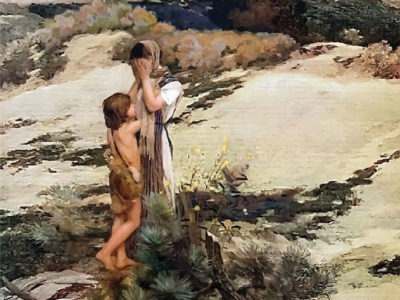I DON’T LIKE some people in the Bible.
Granted, I don’t know any of them. All I know about them is what I read in the Bible.
Maybe if I met them face-to-face, and had coffee and a peanut butter cookie with them, and heard the rest of their story it would turn out that I like them after all.
In the meantime, I don’t care much for the mother of the Jews. Sarah. Wife of Abraham. Mother of Isaac.
She had a mean streak, unless the Genesis writer was into fiction.
Sarah makes her slave girl Hagar have sex with Abraham, who is in his mid-80s.
Yes, I know it’s the custom of the day to use a surrogate like that to produce a kid for an infertile and kidless couple. But that’s just mean. Yucky mean.
Then when Hagar gets pregnant and Sarah starts to feel that Hagar is rubbing it in, Sarah complains to Abraham. He’s apparently too busy watching his sheep grow wool. He tells Sarah, “Your maid is your business” (Genesis 16:6).
Sarah abuses pregnant Hagar.
The Bible doesn’t say how a woman in her mid-seventies could abuse a young lady.
Whop her with a broom, maybe. Beat her with a stick. Make her cook bear grease gravy during her first trimester and then threaten to name her kid Kay – Hebrew for “Upchuck.”
Whatever the abuse, it was so bad that Hagar ran away. She came back only after an angel told her to. Hagar gave birth to a son, Ishmael.
Somewhere around 14 years later 91-year-old Sarah had her own son, Isaac.
Abraham and Sarah threw a party when Isaac was weaned from breast milk, perhaps at age three or older. Scholars say breastfeeding lasted longer back then.
Sarah saw the two boys playing together at the party.
Perhaps Ishmael was teasing his little brother. The Hebrew word describing how they were playing can go either way – teasing or just having fun.
Whatever the case, Sarah got upset.
What she says next makes it sound as though she wasn’t especially upset about what she was seeing. She was upset about what was yet to come.
Tradition in the ancient Middle East was that the oldest son got a double share of the estate when his father died – he got twice as much as any of the other sons. Forget the daughters; they got squat. The oldest son also got to lead the extended family. He was the new boss after his dad died.
All that good stuff would go to Ishmael, Sarah realized.
She tells her husband, “Throw out this slave woman and her son. Her son should not inherit anything; my son Isaac should receive it all” (Genesis 21:10).
In a shocker, God tells Abraham to go ahead and do it.
In this story, as some folks read it, it seems even God gets a little dirty. Sarah, by comparison, takes a mud bath. There is nothing in Sarah’s reported relationship with Hagar and Ishmael that makes a body warm up to this seemingly evil stepmother.
Still, there must have been something good about this woman. Her son sure loved her.
He was a 40-year-old bachelor when Sarah died. Isaac missed her so much that Father Abraham had to get a woman to comfort him. Abraham sent his most trusted servant up to Turkey to bring back a cousin, Rebekah.
“She was a special comfort to him after the death of his mother” (Genesis 24:67).
What a polite way of putting that.
What’s your take on Sarah? God certainly gave her a big thumbs up when he gave her a son.
Wonder what he saw in her?


I think the only reason is because the promise was made to Abraham and “His seed,” and just like all of us, God loves us by shear Grace and Mercy — not because of anything we do or merit — all by God’s sovereign choice — no explanation given. Paul discusses this in his letter to the Romans — which really doesn’t answer what God sees in people (and whatever God sees is God’s business Lol). Our response is thank you God for showing grace and mercy to us…
Romans 9:6-16 (NIV)
6 It is not as though God’s word had failed. For not all who are descended from Israel are Israel. 7 Nor because they are his descendants are they all Abraham’s children. On the contrary, “It is through Isaac that your offspring will be reckoned.” 8 In other words, it is not the children by physical descent who are God’s children, but it is the children of the promise who are regarded as Abraham’s offspring. 9 For this was how the promise was stated: “At the appointed time I will return, and Sarah will have a son.”
10 Not only that, but Rebekah’s children were conceived at the same time by our father Isaac. 11 Yet, before the twins were born or had done anything good or bad—in order that God’s purpose in election might stand: 12 not by works but by him who calls—she was told, “The older will serve the younger.” 13 Just as it is written: “Jacob I loved, but Esau I hated.”
14 What then shall we say? Is God unjust? Not at all! 15 For he says to Moses,
“I will have mercy on whom I have mercy, and I will have compassion on whom I have compassion.”
16 It does not, therefore, depend on human desire or effort, but on God’s mercy.